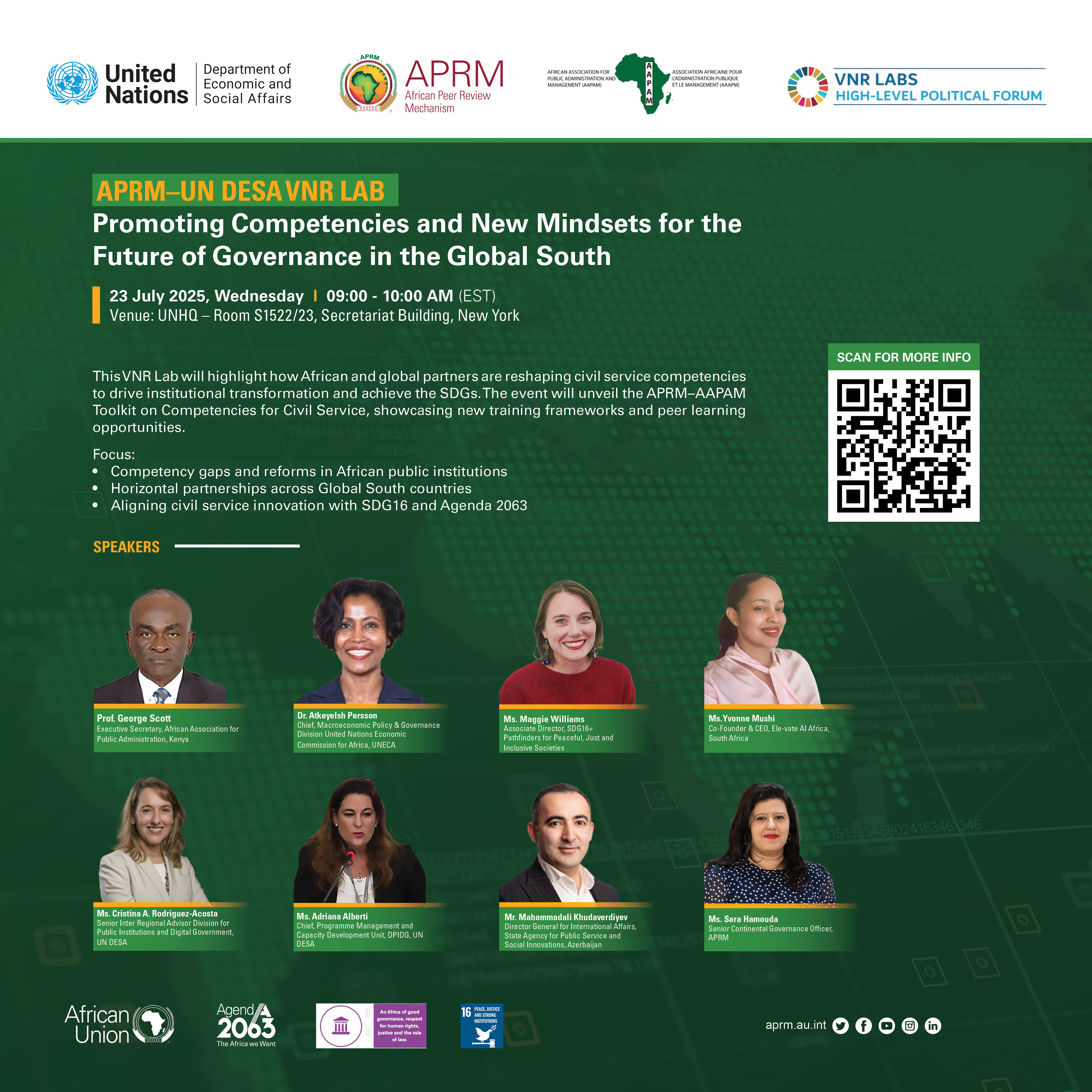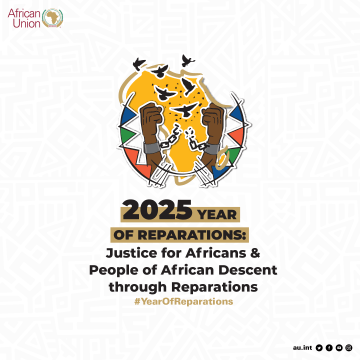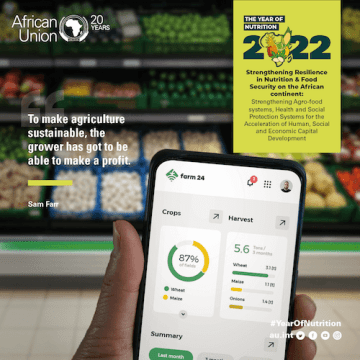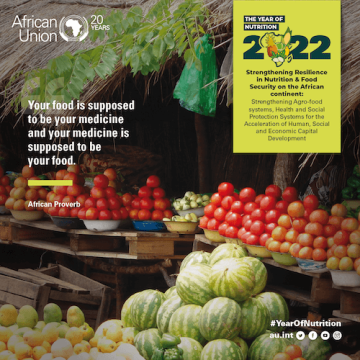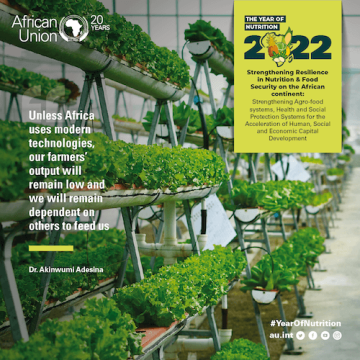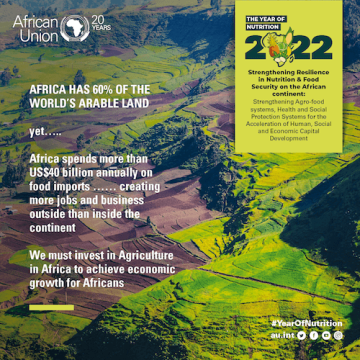APRM-UN DESA VNR Lab
Promoting Competencies and New Mindsets for the Future of Governance in the Global South
23 July 2025
UNHQ - Room S1522/23 | 9:00-10:00 am (NY time)
Overview
A VNR Lab on “Promoting Competencies and New Mindsets for the Future of Governance in the Global South” will be held at United Nations Headquarters on 23 July 2025, within the framework of the 2025 High-level Political Forum. The VNR Lab is jointly organized by the African Peer Review Mechanism (APRM) and the United Nations Department of Economic and Social Affairs (UN DESA), through its Division for Public Institutions and Digital Government, in collaboration with the African Association for Public Administration and Management (AAPAM).
An effective civil service is paramount for accelerating the 2030 Agenda for Sustainable Development and the Agenda 2063 in Africa. Over the past five years, the African Union and the United Nations Department of Economic and Social Affairs (UN DESA) have collaborated in accelerating civil service reforms guided by the Principles of Effective Governance for Sustainable Development, which were endorsed in 2018 by the United Nations Social and Economic Council (ECOSOC). The aim of this collaboration is to assist countries strengthen their state capacity and build public trust by promoting effective, accountable, and inclusive public institutions in line with SDG 16 and Aspiration 3 of Agenda 2063, which calls for good governance, democracy, respect for human rights, justice, and the rule of law.
Making institutions effective, accountable, and inclusive, as envisioned in SDG 16, requires public administration systems to cultivate new mindsets and competency frameworks that can advance the principles of the 2030 Agenda across the public service and ensure that they are put into practice. They must also reflect the principles of effective governance for sustainable development. In this regard, UN DESA, through its Division for Public Institutions and Digital Government (DPIDG), has developed a UN competency framework for public servants to realize the sustainable development goals, which can also be utilised at the continental level in Africa and adapted to specific contexts.
The African Peer Review Mechanism (APRM) in collaboration with the African Association for Public Administration and Management (AAPAM-Kenya) has also developed a Toolkit which aims at assessing the training and leadership needs of African Civil Servants. The Toolkit was developed as a recommendation from the APRM Baseline Study on the Implementation of Principles of Effective Governance of SDGs and Agenda 2063 in Africa, which identifies gaps including in competencies of civil service and provides recommendations to enhance leadership and training approaches for an agile civil service in Africa.
Objectives
This VNR Lab will provide a platform to:
- Highlight efforts undertaken by different institutions to promote new civil service competencies and mindsets at the global and continental levels, in alignment with the SDGs reviewed at the HLPF.
- Unpack the findings of the AAPAM-APRM Toolkit on Competencies for Civil Service and how horizontal partnerships can be forged to sustain the AU-UN collaboration for efficient and effective institutional resilience in the continent.
- Forge experience-sharing between countries from the global south on how to promote competencies and mindsets in the civil service for the promotion of the SDGs and Agenda 2063
- Elaborate opportunities of collaboration between African and countries of the global south to enhance training opportunities for civil servants and APRM national structures.
Expected Audience and Outcomes
- African Ministers and Senior Experts responsible for national development planning
- Representatives of VNR Countries at the HLPF 2025
- UN Agencies, African Union
- APRM Strategic partners
- African youth, women, representatives of civil society, and other major groups.
Outcomes and recommendations from this VNR Lab will be made available on the APRM and UN DESA’s websites.
Proposed Programme
Moderator:Ms. Cristina Rodriguez-Acosta, Senior Interregional Adviser on Innovation and Digital Government, Division for Public Institutions and Digital Government, UN DESA
TIME | |
9:00 am – 9:05 am | Welcoming Remarks · Ms. Adriana Alberti, Chief, Programme Management and Capacity Development Unit, Division for Public Institutions and Digital Government (DPIDG), UN DESA |
9:05 am- 9:15 am | Keynote Speech · Prof. George Scott, Secretary General, African Association for Public Administration and Management (AAPAM), Kenya (tbc) |
9:15 am – 9:25 am | AAPAM-APRM Toolkit on Competencies for Civil Service: An Overview · Ms. Sara Hamouda, Continental Governance Officer, African Peer Review Mechanism (APRM) Continental Secretariat, African Union |
9:25 am – 9:45 am (5 minutes each) | Country experiences in promoting civil service competencies and mindsets to advance the SDGs and Agenda 2063 · Mr. Charmarke Idris Ali Idris, Managing Director of Institute of Administration Djibouti, Djibouti (VLR) or a representative · Ms. Winniefred Akoto-Sampong, Head of APRM National Secretariat, Ghana · Government of Bahamas (TBC) |
9:45 am – 9:50 am | Q&A |
9:50 am – 9:55 am | Key Takeaways · Margaret (Maggie) Williams , Associate Director of SDG16+ -Pathfinders, Center on International Cooperation (CIC), New York University |
9:55 am – 10:00 am | Closing Remarks · Ms. Atkyelesh Persson, Chief of the Urbanization and Development Section, UNECA |
Contact Persons:
- Sara Hamouda, Senior Continental Governance Officer, APRM Continental Secretariat. sara.hamouda@aprm-au.org
- Adriana Alberti, Chief, Programme Management and Capacity Development Unit, Division for Public Institutions and Digital Government, UN DESA, alberti@un.org
Relevant Reading Material:
Mindsets and Competency Framework for Public Servants to Realize the SDGs, UN DESA

